Lara Logan is a South African TV and radio journalist as well as a war correspondent. She is one fierce woman who has toured multiple war zones, personally endured horrendous treatment, and is one of the very few remaining honest journalists out there.
I highly recommend watching this 10-minute clip of Lara red-pilling the media on Ukraine.
The propaganda machine is in high gear.
Anytime you’re allowed only one view on any given topic, you can rest assured that there is more, maybe much more to it than you’re being told.
It likely won’t matter as the vast majority of people spend their time in front of the TV with their eyes wide open and their thinking suspended.
In a now deleted tweet, Zelenskyy’s ex-spokeswoman posted a picture of three exhausted firefighters, praising the work of Ukraine’s fire service. The trouble is, the picture was that of Australian firefighters from 2019.
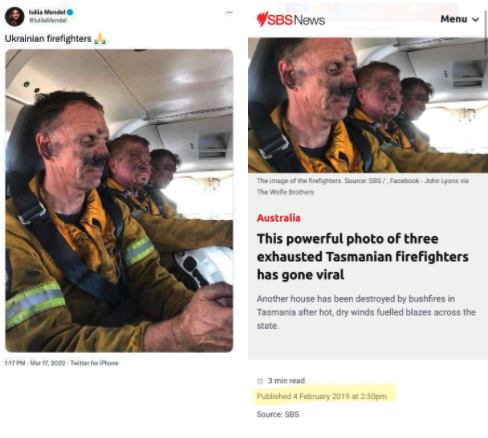
They’re lying. So what? Well, I don’t know, but this doesn’t look like it’s going to get settled too quickly.
Aside from the potentially horrendous nuclear world war, there’s a problem for multiple industries impacted by a prolonged conflict.
Russia is a large energy producer
Every man and his dog understands by now that Russia is a large energy producer (though you’d be surprised as to how little people actually know), but what many don’t know is that when they sit down at the dinner table at night, the entire supply chain (aside from the energy required for transportation) that gets them that dinner involves Russia and Ukraine to a frightening degree.
You see, our current globally integrated food supply system and mass food production cannot exist without, among other things, fertilizer. This includes three main categories: nitrogen, potash, and phosphorus fertilizers. Potash is a potassium-rich salt fertilizer that enhances plant quality and is responsible for 20% of global fertilizer demand.
Together with Belarus, Russia has a 40% market share in global production and export of potash fertilizer. What OPEC+ is to the oil market, Belarus and Russia are to the potash market. The two monopolies in this space are Uralkali and Belaruskali, with the Belarusian Potash Company being the latter’s export arm.
With 16.5% of the nitrogen fertilizer market, Russia may not appear to be that dominant until we look at the key ingredient (ammonium nitrate) and then we realise… oh boy, yes it is. You see, it holds a whopping 66% of the global market share in the production of this chemical, and without it there’s no nitrogen fertilizer.
All this matters a great deal for those of us who like to eat, because earlier this month the Russkies imposed an export ban on the ammonium nitrate mentioned above. Their reasoning, true or not, was to ensure an affordable supply for its own farmers. This ban comes off on 2 April. “Fine, what’s a few weeks wait,” you say.
Well, farming isn’t like manufacturing iPhones. If you’re missing some component of the phone you can plonk it in a month or two later and voila, it’ll all still work. Sure, your overall opex related to carrying the product for longer than anticipated is impacted but it’ll still work. Try that in farming and you miss your planting cycle. You miss your planting cycle and you can literally go bankrupt. It’s a big flipping deal, and it’s going to have a lasting impact on anyone who needs food, which is everyone except for maybe that hideous creature Agustin Carsten, the head of the Bank for International Settlements.
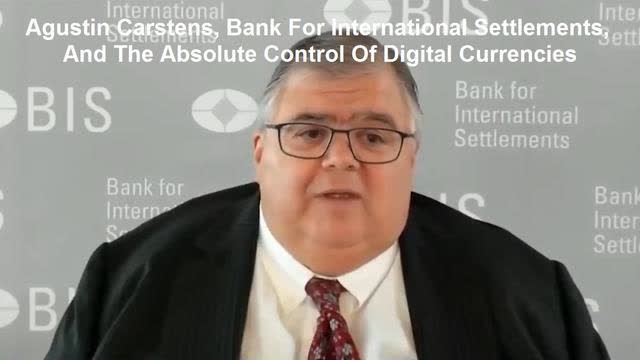
If you don’t know who he is, he’s the guy who is pushing for us to all become slaves in his new CBDC world. He could go without some food, but for everyone else though, this is a problem.
It doesn’t stop there, though. Digging into this we found something we were not yet aware of.
Morocco’s OCP Group remains world top exporter of phosphates | The North Africa Post
The Moroccan state-owned OCP group has maintained its leading position as the world first exporter of phosphates although its market share decreased from 38 pc to 34 pc between January & September 2019, but in phosphoric acid, the Group remains the biggest worldwide exporter, with a 49 pc global market share.
So what does this have to do with those Russkies?
Well, through the company Uralchem, Russia provides ammonia to Morocco, and Morocco, as it turns out, is the largest phosphate fertilizer producer in the world with 75% of phosphate reserves.
How much ammonia? More than half.
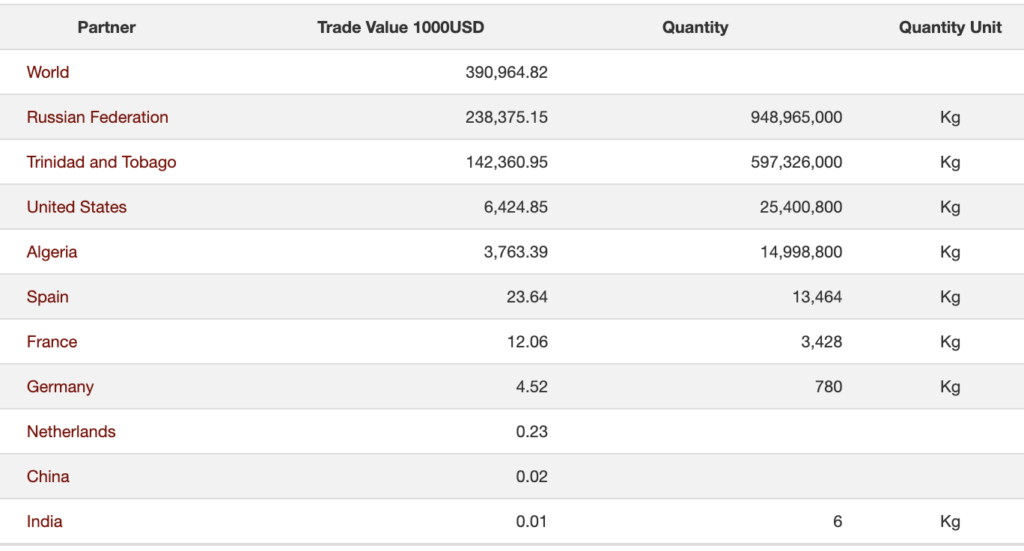
Russian fertilizer companies have recently gained a monopoly over imports of phosphate fertilizer into Europe over the past year by supplying low cadmium fertilizer, which became required under a new EU directive in 2019. Morocco, Europe’s foremost supplier, has higher cadmium levels in their phosphate fertilizer, putting them at a disadvantage.
Oh, what a tangled web this all is. The second order effects of a world that was moving down the globalisation freeway at 100 miles per hour and which hasn’t merely put on the brakes or even stopped, but is attempting to throw the gear shift into reverse and gun the engine is going to throw all sorts of spanners into this system. We have only just begun to scratch the surface of the repercussions.
Our fertilizer plays haven’t been the worst thing ever. Sure, we had to wait, be patient, and suffer drawdowns through 2018, 2019, and 2020, but they have begun to get up out of bed and many of you will be sitting on some juicy returns.
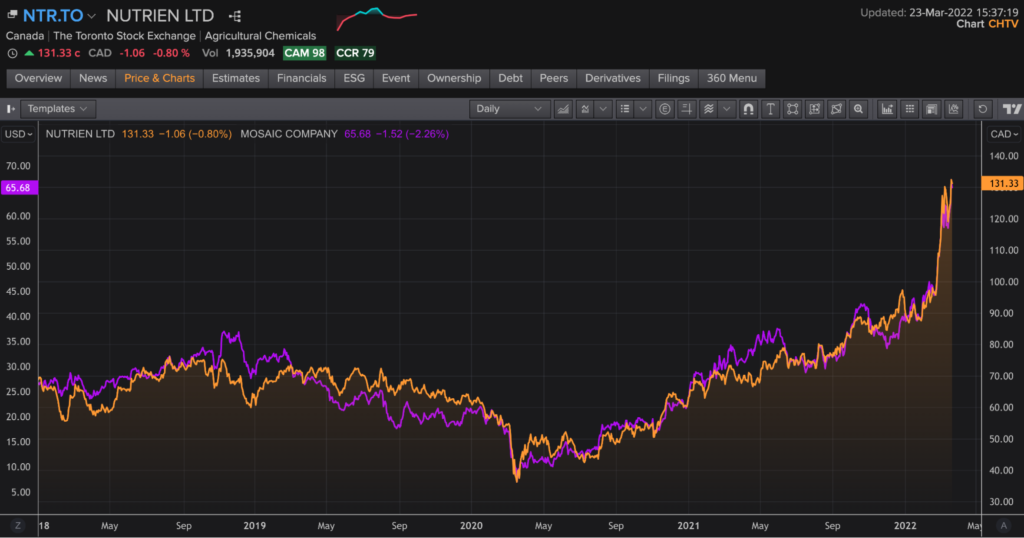
But wait, hold up a second. As we like to point out repeatedly here, look at the forest, not the trees. This bull market is still a young pup, and we’ve still got a ways to go. So buckle up and enjoy the ride because this one looks like it’ll be one for the record books.
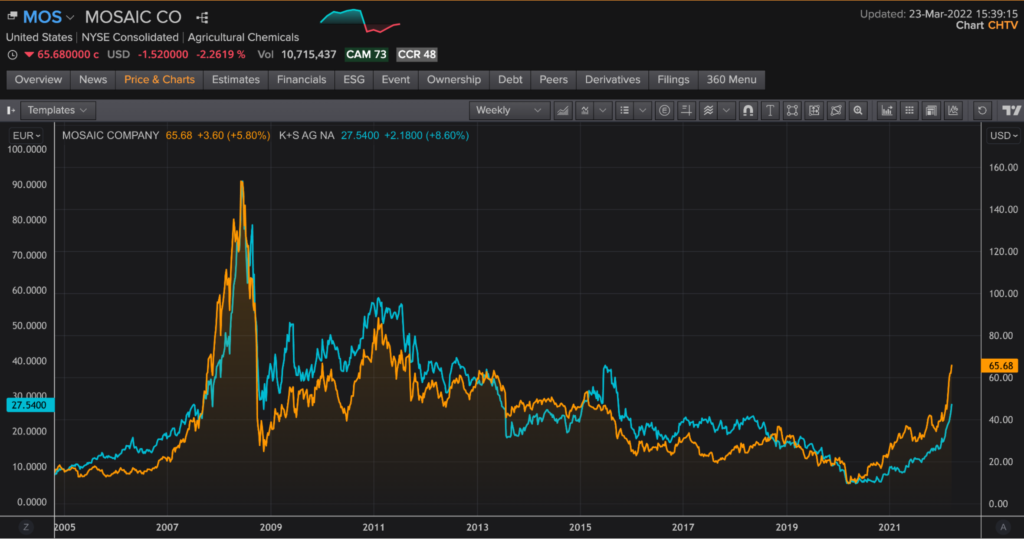
Deglobalisation
On the topic of this deglobalisation that we’re hurtling into, I was discussing this with our team here just yesterday, and what I think is most probable is that all these coercive parasitic global organizations such as the United Nations, the IMF, the World Bank, who manage to implement greater control systems such as CRS (common reporting standard) and many others like it, will splinter and crack under the increasing pressure. We’re going tribal, and I simply don’t see a world with tribal instincts running rampant coexisting with increasingly coercive forces being applied.
Case in point. Given the unprecedented freezing of Russian citizens’ assets globally, do you really think that Russia (currently a signatory to and participant in CRS) will be divulging financial information from their banks to any Western counterparts?
Do you think the Chinese government will be doing the same? What about India who the West are now threatening?
No. This unravels.
That’s a good thing. Decentralized is better than centralized in this instance.
It will be messy, and frankly, I can’t see us escaping bloodshed.
Speaking of things breaking apart. Russia just stated they’d be accepting rubles, gold, and — deep breath — bitcoin in exchange for natural gas.
Russia Is Open To Selling Natural Gas For Bitcoin
“When it comes to our ‘friendly’ countries, like China or Turkey, which don’t pressure us, then we have been offering them for a while to switch payments to national currencies, like rubles and yuan,” Zavalny said during the press conference.
“With Turkey, it can be lira and rubles. So there can be a variety of currencies, and that’s a standard practice. If they want bitcoin, we will trade in bitcoin.”
As to the “unfriendly states,” they can pay in rubles.
Whoo boy! This is getting spicy.
So what takeaways do we have from all of this?
Well, you’d be silly not to own physical gold in this environment. That’s true for you and I, but realize it’s true too for central banks. And THAT is a big deal.



This Post Has 2 Comments
Bugger. Lara censored already.
Lara Logan corrected video link https://vimeo.com/692630209